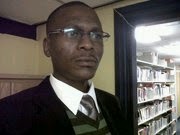 |
Abel Thulare
SABC Information Librarian |
The interview is with Abel Thulare, an Information Librarian who works in the Newspaper Cutting Section of the SABC Information Library. He works very close with SABC Television and Radio journalists and producers in ensuring that they get the most up-to-date information about any requested topic that they are working on.
Please tell us a little bit about yourself. (Where you grew up, where and what you studied and your work experience before you joined the SABC Information Library)
Born in a small town called Sabie, in Mpumalanga Province. I moved to Tembisa at the age of two. After completing my matric I studied B.Bibl. at the university of Pretoria which I completed (Former Rand Afrikaans University) now known as University of Johannesburg. I conducted my in-service training at the Kempton Park Public Library in 1998. In 2000 I worked as a Professional Library Assistant at St John’s College Library. I then went on to further my studies at Havatech-Pretoria where I studied IT (Programming) which I found very exciting & challenging. In 2002 I worked as a Junior Librarian at Africa Institute of South Africa (AISA). In 2004 I moved to the Council on Higher Education where I managed the Resource Centre. Between 2007 & 2008 I worked for two different companies Spar North Rand (Dry Goods Receiver/Checker) and ABI Midrand (Supervisor). I then moved to the SABC in June 2008 and to tell the truth I’m here to stay!
Well-well-well! I’m a good cook, baker and mechanic.
Please tell us about a normal day in your office. What material do you give priority to?
Scanning SABC Radio Bulletins dating back as far as the mid 1950’s.
Electronic cutting and pasting of current newspapers for preservation.
Providing efficient information to internal & external stakeholders as fast as lightning.
I sometimes man the book & magazine section if my colleagues are not around.
I try by all means to keep a balance of my chores.
Tell us more about your collection and the scope of material you need to preserve.
The Newspaper Cutting Section in the SABC Information Library has a collection of 3 200 000 newspaper articles. The following newspapers are ordered for this section: Beeld, Sowetan, Business Day, Star, Citizen, Mail and Guardian, Rapport, Sunday Times, Sunday Independent, Sunday World and the City Press. Every day articles are scanned in on the Newbase System and then electronically cut, pasted and indexed. We select the articles which are newsworthy, broadcast related or important to keep for our heritage.
Do you struggle with technical difficulties, and if so, what?
Of course yes! First of all it’s our email. I always use more of it to send information requests to internal & external stake holders.
If you have an anecdote about a specific piece of interesting information, please share it with us.
“We will make sure the men in blue end up in orange if they commit crime” Gen Bheki Cele. That’s a good one for me.
Tell us why you enjoy doing the work that you do.
It keeps me busy and up to date with what is happening around us.


.jpg+-+Ntokozo.jpg)




